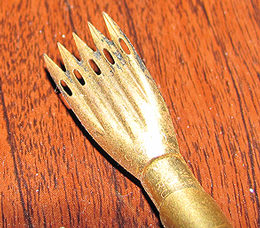rastrum
Jump to navigation
Jump to search
English
[edit]
Etymology
[edit]Learned borrowing from Latin rāstrum (“rake”).
Pronunciation
[edit]Noun
[edit]rastrum (plural rastrums)
- A five-pointed writing implement used to draw parallel lines of a staff in sheet music.
Latin
[edit]Alternative forms
[edit]- rāster m
Etymology
[edit]From rād(ō) (“I scrape”) + -trum, from Proto-Indo-European *reh₁d- + *-trom. Compare with rādula and rallum. Doublet of rōstrum.
Pronunciation
[edit]- (Classical Latin) IPA(key): /ˈraːs.trum/, [ˈräːs̠t̪rʊ̃ˑ]
- (modern Italianate Ecclesiastical) IPA(key): /ˈras.trum/, [ˈräst̪rum]
Noun
[edit]rāstrum n (genitive rāstrī); second declension
Declension
[edit]Second-declension noun (neuter or otherwise).
| singular | plural | |
|---|---|---|
| nominative | rāstrum | rāstra rāstrī |
| genitive | rāstrī | rāstrōrum |
| dative | rāstrō | rāstrīs |
| accusative | rāstrum | rāstra rāstrōs |
| ablative | rāstrō | rāstrīs |
| vocative | rāstrum | rāstra rāstrī |
- The plural can be either masculine (as if from rāster, a form that is unattested in Classical Latin but occurs in later glosses) or neuter.
Derived terms
[edit]Related terms
[edit]Descendants
[edit]Noun
[edit]rāstrum
References
[edit]- “rastrum”, in Charlton T. Lewis and Charles Short (1879) A Latin Dictionary, Oxford: Clarendon Press
- “rastrum”, in Charlton T. Lewis (1891) An Elementary Latin Dictionary, New York: Harper & Brothers
- rastrum in Charles du Fresne du Cange’s Glossarium Mediæ et Infimæ Latinitatis (augmented edition with additions by D. P. Carpenterius, Adelungius and others, edited by Léopold Favre, 1883–1887)
- rastrum in Gaffiot, Félix (1934) Dictionnaire illustré latin-français, Hachette.
- “rastrum”, in Harry Thurston Peck, editor (1898), Harper's Dictionary of Classical Antiquities, New York: Harper & Brothers
- “rastrum”, in William Smith et al., editor (1890), A Dictionary of Greek and Roman Antiquities, London: William Wayte. G. E. Marindin
- “rastrum”, in The Century Dictionary […], New York, N.Y.: The Century Co., 1911, →OCLC.
Categories:
- English terms borrowed from Latin
- English learned borrowings from Latin
- English terms derived from Latin
- English 2-syllable words
- English terms with IPA pronunciation
- English lemmas
- English nouns
- English countable nouns
- en:Writing instruments
- Latin terms suffixed with -trum
- Latin terms derived from Proto-Indo-European
- Latin doublets
- Latin 2-syllable words
- Latin terms with IPA pronunciation
- Latin lemmas
- Latin nouns
- Latin second declension nouns
- Latin neuter nouns in the second declension
- Latin neuter nouns
- Latin non-lemma forms
- Latin noun forms
- la:Tools
